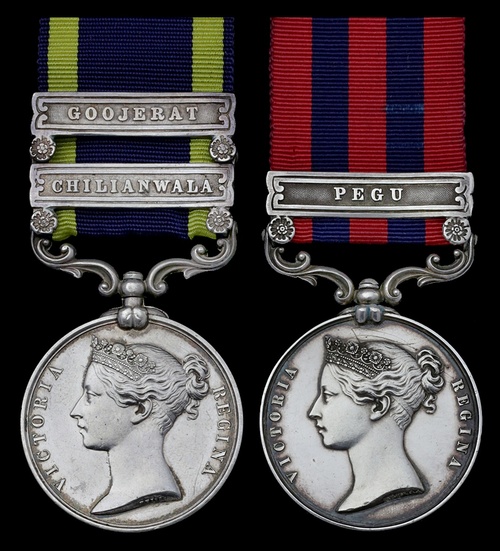
Auction: 19003 - Orders, Decorations and Medals
Lot: 159
The important Punjab and Second Burma War campaign pair awarded to Captain L. J. Trotter, a prominent historian of British India whose biography of Sir James Outram, Bayard of India (1903), remains unsurpassed as a portrayal of that officer's service during the Mutiny
Trotter wrote prolifically on matters of governance during the British Raj, publishing his landmark History of India in 1874. He wrote biographies of Warren Hastings, Lord Auckland and The Marquess of Dalhousie, spending eleven years as editor of Allen's Indian Mail
Punjab 1848-49, 2 clasps, Chilianwala, Goojerat (Ensign L. J. Trotter, 2nd Ben. Eur. Fus.); India General Service 1854-95, 1 clasp, Pegu (1st Lieutt. Lionel Jas. Trotter. 2nd. European Bengal Fusrs.), light contact marks, very fine (2)
Lionel James Trotter was born at Chowringhee, Calcutta in September 1827, the son of Edward Trotter of Calcutta. Educated at Charterhouse and Merton College, Oxford, he sailed to India in 1847 as a Cadet of the Bengal Infantry. He served as an Ensign with the 2nd Bengal (European) Light Infantry throughout the 1848-49 Punjab campaign, including the battles of Chilianwala and Goojerat. Part of Brigadier Godby's Brigade, in Sir Walter Gilbert's 2nd Division, the regiment held the right flank at the Battle of Goojerat on 13 January 1849, and suffered heavy losses during the attack against Sikh entrenchments. The British commander, General Gough, ordered the infantry to advance into a belt of thorn and mimosa scrub a mile thick, without artillery support. The British sustained over 2,500 casualties, which are commemorated by an obelisk on the battlefield. The elderly Brigadier Pope, commanding the British cavalry on the right flank, gave his infamous "Threes About" order which led his men to crash into the 2nd Bengal (European) Light Infantry, causing havoc. The following year, Trotter's regiment was renamed as the 2nd Bengal (European) Fusiliers. In 1853 he served with a wing of this regiment during the Second Burma War, receiving the clasp 'Pegu' to his India General Service Medal. During the Indian Mutiny of 1857 he commanded the depot and station at Subathoo, in the western Himalayas. He retired on half pay in 1862.
Trotter became a renowned authority on the history of British rule in India. His two-volume Studies in Biography, and the British Empire in India appeared in 1865. Nine years later he completed his magisterial History of India, from the Earliest Times to the Present Day (1874), which ran to three editions and remains a key source for modern historians wishing to understand the Victorian perception of India's past. He edited Allen's Indian Mail from 1867 to 1878. He authored definitive biographies of Warren Hastings (1879) and John Nicholson (1897), recording every detail of India's governance by the British in his Statesmen and Rulers of India series. His most famous work is undoubtedly The Bayard of India, A Life of Sir James Outram (1903), now available in paperback. A regular columnist for The Agra Messenger, he contributed to Saunders' Magazine, Universal Review, Dublin University Magazine and The New Review. He was also a talented linguist: his English translation of La Sorcière, a history of Satanism and Witchcraft by the French thinker Jules Michelet, was published in London in 1863.
In 1856, while on furlough, Trotter married Mathilda Waring, daughter of Dr. Richard Waring, F.R.S., F.R.C.P. of Hastings. He fathered three children. The 1901 census shows him living as a 'Retired Army Captain' at Marlings, Enys Road, Eastbourne, with his daughters Jannette and Lily. He died at 332 Banbury Road, Oxford in May 1912, and was buried at Wolvercote Cemetery. His obituary appeared in The Times on 7 May 1912; sold with copied Who's Who entry.
Subject to 20% VAT on Buyer’s Premium. For more information please view Terms and Conditions for Buyers.
Sold for
£1,300
Starting price
£420




